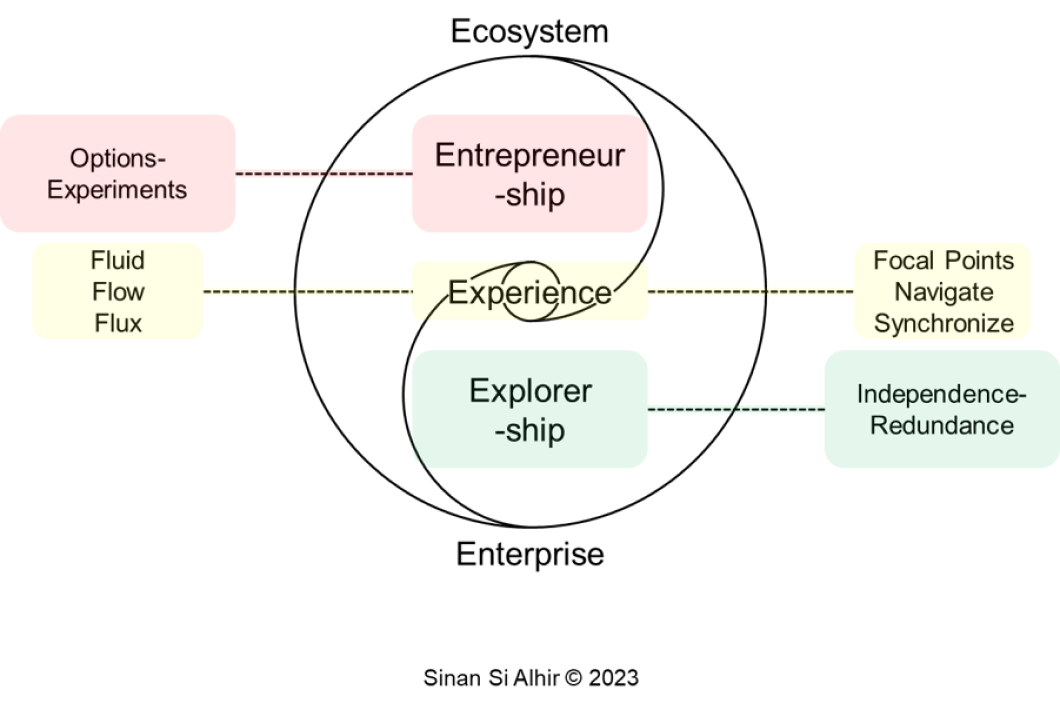Edge Collection (Agility, Resilience, and Antifragility)
Ecosystem Edge
by Si Alhir
This assessment focuses on ecosystem agility, resilience, and antifragility. This may be leveraged by ecosystems and ecosystem leaders.
The Edge: Harness the Paradoxical and Flourish in the Age of Entanglement
If recent years have proven anything, it is that reality is too wild, and we are too tame. Given that
we can't domesticate reality, we must rewild ourselves.
In a turbulent world where we can only expect the unexpected, we can no longer embrace a more traditional worldview
with yesterday's orthodoxy but must embrace a more modern worldview and reconceptualize our experience for today's reality.
This includes reconceptualizing our experience of order and disorder, change and disruption, randomness, uncertainty & risk,
crisis, complexity & systems & paradoxical thinking, becoming future-ready & future-fit & future-proof, wicked problems,
and much more.
This involves embracing the edge --- leveraging ecosystem thinking to cultivate individuals, teams, enterprises, and
ecosystems that embody agility, resilience, and antifragility --- to harness (beyond manage and navigate) the paradoxical
and flourish (not only survive but thrive) in the age of entanglement.
These surveys demystify agility, resilience, and antifragility and assess how they are operationalized at the individual,
team/community/collective, organization/enterprise, and ecosystem levels as well as reveal insights, guidance, and advice
for catalyzing and transforming individuals, teams, enterprises, and ecosystems to achieve greater success.
Ecosystem Thinking
How do we harness, beyond manage and navigate, unprecedented levels of turbulence? How do we flourish, not only survive but thrive, in a world where we can only expect the unexpected?
Ecosystem thinking offers a worldview composed of framing pillars, core concepts, foundational principles, and contextual practices.
The framing pillars (5 Es / 5 Cs) of ecosystems express ecosystem thinking conceptually.
An ecosystem is a configuration of stakeholders in continuous reconfiguration.
Entrepreneur-ship involves congruence among stakeholders.
Explorer-ship involves connection among stakeholders.
An enterprise involves coherence among stakeholders.
Experience involves continuous calibration with reality.
The foundational principles of ecosystems include entrepreneur-ship using options & experiments and explorer-ship using independence and redundancy.
The contextual practices of ecosystems express ecosystem thinking operationally in a specific context; that is, expressing foundational principles using core concepts in a specific context to create specific practices.

Team Edge
This assessment focuses on team agility, resilience, and antifragility. This may be leveraged by teams and team leaders.
Enterprise Edge
This assessment focuses on organizational or enterprise agility, resilience, and antifragility. This may be leveraged by enterprises and enterprise leaders.
Ecosystem Edge
This assessment focuses on ecosystem agility, resilience, and antifragility. This may be leveraged by ecosystems and ecosystem leaders.
Individual Edge
This assessment focuses on individual agility, resilience, and antifragility. This may be leveraged by individuals, team members, team and enterprise leaders, and ecosystem leaders.
Natural Human Leadership
This assessment focuses on leadership. This may be leveraged by individuals, team members, team and enterprise leaders, and ecosystem leaders.
Top Features
Proven
Leverage proven practice-informed theory and theory-driven practice, beyond peer-reviewed research, to quickly identify where attention is needed and initiate action to help.Insightful
Gain insights expeditiously and perform analysis at the individual, team, enterprise, and ecosystem levels.
Impactful
Give individuals, teams, enterprises, and ecosystems a voice to express where a meaningful difference is needed.Comparative
Benchmark the level of agility, resilience, and antifragility across individuals, teams, an enterprise, and an ecosystem against other enterprises and ecosystems.


